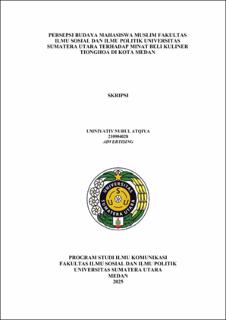Persepsi Budaya Mahasiswa Muslim Fakultas Ilmu Sosial dan Ilmu Politik Universitas Sumatera Utara Terhadap Minat Beli Kuliner Tionghoa di Kota Medan
The Cultural Perception of Muslim Students of the Faculty of Social and Political Sciences at the University of North Sumatera on the Purchase Intention of Chinese Cuisine in Medan

Date
2025Author
Atqiya, Umniyatiy Nurul
Advisor(s)
Lubis, Lusiana Andriani
Metadata
Show full item recordAbstract
This research is titled " The Cultural Perception of Muslim Students of the Faculty of Social and Political Sciences at the University of North Sumatera on the Purchase Intention of Chinese Cuisine in Medan". The study aims to determine the influence of cultural perception on the purchase intention of Chinese cuisine among Muslim students at the Faculty of Social and Political Sciences, Universitas Sumatera Utara. This study employs a descriptive quantitative approach with a total sample of 100 respondents selected through purposive sampling. The theoretical framework is based on Samovar’s concept of cultural perception, which includes worldview, symbol system, and social organization, as well as Ferdinand’s theory of purchase intention. The data analysis techniques used include univariate table analysis, cross-tabulation, and hypothesis testing through simple linear regression analysis using SPSS version 27. The results show a positive and significant effect of cultural perception on purchase intention, with the regression equation Y = 22.498 + 0.874X. The coefficient of determination (R²) is 0.409, indicating that cultural perception explains 40.9% of the variance in purchase intention, while the remaining variance is explained by other factors. The F-test yielded a value of 67.844 with a significance level of <0.001 (<0.05), indicating that the regression model is significant. The t-test resulted in a value of 8.237 with a significance level of <0.001, confirming that the effect of cultural perception on purchase intention is statistically significant. This study concludes that the more positive the students’ cultural perception, the higher their purchase intention toward halal-compliant Chinese culinary. These findings contribute theoretically to intercultural communication and consumer behavior studies and provide practical insights for culinary business practitioners in designing marketing strategies that are sensitive to cultural and religious values.
Collections
- Undergraduate Theses [1873]
